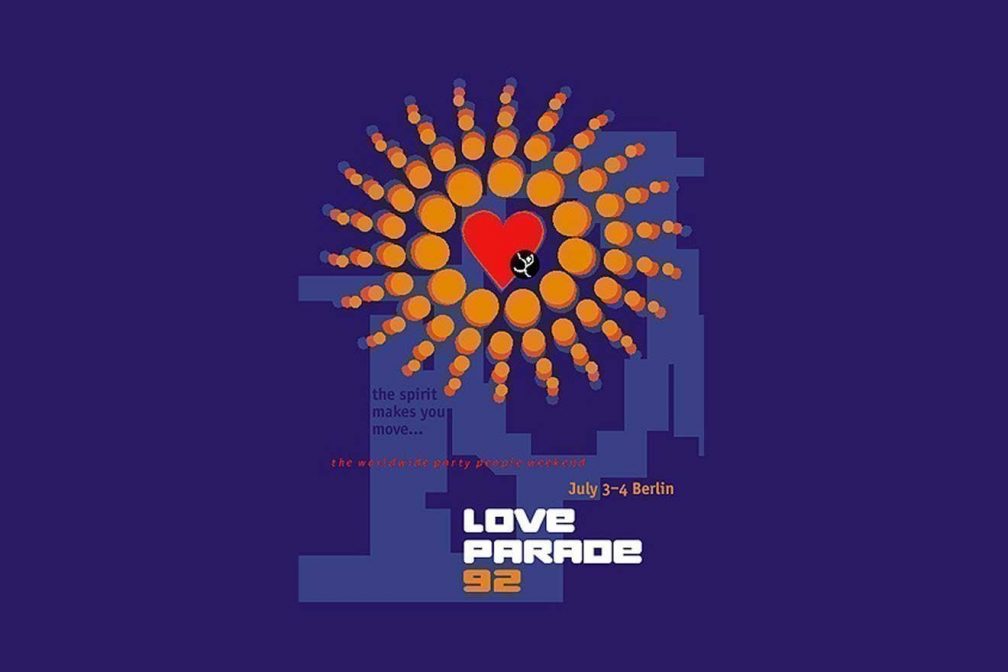 Features
Features
Love Parade '92: The sound of the family
Matthew Collin recalls the Berlin Love Parade of 1992 and reveals how it was inspired by the UK’s Summer of Love
In an exclusive extract from new book Pop Grenade Matthew Collin (author of the brilliant Altered State) recalls the Berlin Love Parade of 1992, as the city's techno scene was taking shape – and reveals how it was inspired by the UK's Summer of Love
And then the skies opened and the rain came down… lightning flashed like a celestial strobe and thunderclaps crashed off the walls, hammering out a counterpoint to the crackle of snare drums from the sound systems as our disorderly procession of trucks pulled into Wittenbergplatz… as the deluge raged harder, arms reached upwards to embrace the downpour like a benediction from above, slashing geometric patterns out of the clouds of white mist rolling low overhead from the fog machines on the trucks, screaming in rapture as dirty blurts of electronic bass and the vicious screech of a synthesiser tore out of the speakers yet again, the anthem of the moment, 'Der Klang Der Familie' – the sound of the family.
July 1992, Berlin: "There is a sense of lawlessness, a millennial party being played out at top speed," I wrote in a report that I filed shortly afterwards – a sense that anything was possible in this city hurtling into its future, where the old rules had ceased to exist and new ones were yet to be written.
At the time, the Love Parade was a relatively obscure German phenomenon which that year attracted around 15,000 hardline technoheads – a figure that seemed phenomenal to us then, yet tiny in comparison with the 1.5 million ravers who would join the party seven years later.
The Love Parade at the start of the 90s was still a gathering of the clans from across the recently reunited reunited country to revel in the sheer exuberance of their own existence, to show off their extravagant beauty in all its polymorphous perversity, out there on Berlin's upmarket retail drag, the Kurfürstendamm. To give the Saturday shoppers a little jolt of surprise, certainly, but also to stake a claim on the urban landscape not just as a place for buying and selling, but as the forum for a carnival: our carnival, with its youthful innocence that could not, and did not, last.
I arrived in Berlin that year to help run the first British soundsystem truck in the parade, backed by Daniel Miller's recently launched NovaMute record label. Compared to the other floats, ours was a somewhat rickety, low-budget affair, a little blue lorry that jerked and jolted its way down the Ku'Damm. "For a lot of people, drugs work!" declaimed a voice from the swaying speaker stack as our crew of British and German, black and white, hardcore boys in techno T-shirts and girls in skin-tight shorts bounced on the boards until they were close to cracking.
The parade felt raw and delightfully ramshackle, as if everything had been lashed together at the last minute by a bunch of random urban freaks on a come-down from the previous night's party. In later years, Love Parade floats would become lavish productions, but in 1992, some weren't even really floats at all.
I remember a sleek white limousine with blissed-out ravers sprawled wasted over its long bonnet, and a flame-haired female fire-breather in shocking orange showering sparks as she paraded in front of a multicoloured Manila 'jeepney'; an eccentric gent in full military dress driving what looked like a motorised wheelchair, and another man – for reasons that perhaps only made sense to himself –
pushing a shopping trolley along, wearing just his boots and underpants, while others skimmed through the crowd on rollerskates and bicycles… There was none of the crush and hustle that would typify the parade's later years; there was still space for the twisted imaginations of cultural outcasts to run riot along the city's main consumer thoroughfare at the height of a Saturday afternoon.
Among the bigger trucks, the Planet club's vehicle was tricked out as a huge pink cartoon rabbit with its floppy bunny ears lolling down over the cab. And then there was Tanith's truck … Tanith was an ex-punk turned hardcore techno DJ, the gaunt ringleader of a gang of wilful outcasts on a brain-scrambling journey to the outer limits, and he had an immaculate sense of punk-rock theatre.
In 1992 his float resembled Martin Sheen's patrol boat on its doped-out pyrotechnic voyage through the spooked jungle waterways of Apocalypse Now, but with weapons-grade techno blasting out instead of the Rolling Stones. "It's decked out like a tank, all camouflage and netting, with the DJ as a demented military commandant leading the troops from his gun turret," I wrote at the time. "As the bass drum powerdrills, his comrades set off smoking orange flares. But just when it all starts to look frighteningly militaristic, one of the stormtroopers in combat gear turns to display the peace sign painted on the back of his uniform."


